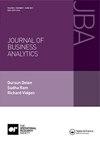对机器学习中可解释性的感知良善的社会评价
IF 1.6
Q3 COMPUTER SCIENCE, INFORMATION SYSTEMS
引用次数: 6
摘要
决策支持系统中的机器学习已经优于现有的统计方法。然而,他们的预测面临挑战,因为计算通常是复杂的,并不是所有的模型预测都是可追溯的。事实上,许多表现良好的模型对用户来说都是黑盒,因此,用户无法解释和理解模型预测背后的基本原理。可解释的人工智能已经成为一个研究领域来抵消这一点。然而,目前的研究往往忽视了人的因素。在此背景下,我们推导并检验了在最终用户的社会评价中影响模型可解释性好坏的因素。我们在双因素因子设计中为四个不同的基准数据集实现了六种常见的ML算法,并要求潜在的最终用户在调查中对不同的因素进行评分。研究结果表明,可解释性的感知良度受问题类型的调节,并与可信度作为最重要的因素密切相关。本文章由计算机程序翻译,如有差异,请以英文原文为准。
A social evaluation of the perceived goodness of explainability in machine learning
ABSTRACT Machine learning in decision support systems already outperforms pre-existing statistical methods. However, their predictions face challenges as calculations are often complex and not all model predictions are traceable. In fact, many well-performing models are black boxes to the user who– consequently– cannot interpret and understand the rationale behind a model’s prediction. Explainable artificial intelligence has emerged as a field of study to counteract this. However, current research often neglects the human factor. Against this backdrop, we derived and examined factors that influence the goodness of a model’s explainability in a social evaluation of end users. We implemented six common ML algorithms for four different benchmark datasets in a two-factor factorial design and asked potential end users to rate different factors in a survey. Our results show that the perceived goodness of explainability is moderated by the problem type and strongly correlates with trustworthiness as the most important factor.
求助全文
通过发布文献求助,成功后即可免费获取论文全文。
去求助
来源期刊

Journal of Business Analytics
Business, Management and Accounting-Management Information Systems
CiteScore
2.50
自引率
0.00%
发文量
13
 求助内容:
求助内容: 应助结果提醒方式:
应助结果提醒方式:


